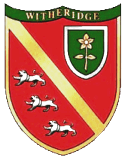

|
The Iron Age in Britain covers the period from about 700 BC to 43 AD following the Bronze Age and before the Roman period when the working and use of iron gradually spread throughout the region. Iron Age Britain was a land, not of towns, but of farms and small villages with people living in with people living in round houses with thatched roofs, and almost certainly in tribal settlements. These settlements would probably have occupied low ground clearances in a generally forested landscape, the lighter soils of the high ground being reserved for agriculture and husbandry.
The objects that archaeologists find when excavating these farms are usually mundane and often in abundance. People did not use money until the end of the era. In some areas people built large hill forts, communities were organized into tribes and larger groups. Perhaps as many as one to two million people were living in the country when the Romans first arrived. The Romans called the Iron Age people Britones or Britanni (Britons). The Britons spoke Celtic languages, which probably originally spread to the island through trade and other contacts, however there is no evidence indicating any mass migrations of 'the Celts' into Britain. Several million people probably lived in Britain at the end of the Iron Age. Most people lived in extended family units, and life expectancy was low. For those who survived infancy, death usually came before they were 35-40. Arthritis was common, as were occasional periods of malnutrition, especially vitamin deficiency. There is little evidence for what people looked like, as Iron Age Britons almost never carved or made images of people. Most people would be farmers, their lives governed by the farming year and the religious festivals that marked it. They would have grown wheat and barley, and kept cattle, sheep and pigs. Excavations have produced evidence to show that most settlements produced evidence of clothes making, woodworking and even blacksmithing. Iron Age Britain is usually considered a particularly warlike period, due mainly to the many hill forts and weapons. The splendour and expense of some of these weapons, and the metal parts of the chariots used by their owners, show the importance or status attached to being a warrior at this time. Trade would probably have taken place within the confines of the Hill Forts which were being built by some of the communities to provide not only sanctuary in time of conflict, but also acted as boundary markers, status symbols, markets, and meeting places. A Hill Fort is an enclosure, sometimes covering many acres, surrounded by ditches and banks, and, as the name indicates, usually sited on the top of a hill. Cranmore Castle overlooking Tiverton, Huntsham Castle, and probably the earth works at Stoodleigh Beacon and Berry Castle near Black Dog are almost certainly of this type, the most famous of which is Maiden Castle in Dorset. Witheridge seems to lack such a hill top enclosure, or does it? The ideal location for a site would be in the area of the present village, lying, as it does, on a spur with wide views over the surrounding countryside. If there had been such a site here, then it is almost certain that any signs of it, in the form of banks and ditches, would have been destroyed centuries ago. What is certain however is that small farmsteads would have peppered the landscape around Witheridge, with their inhabitants eking out a living? Previous Last Edited 03/07/2006 Copyright © 2000-2006 Witheridge Unless otherwise indicated on the page in question, the photographic images reproduced on this site belong to the Witheridge Archives, and, as such may not be reproduced for commercial purposes without written permission. However, you are welcome to use any of the photographs belonging to the archive for personal and/or non-commercial use. Any material shown as not being owned by the archive may not be reproduced in any form without first receiving written permission from the owner of the material in question. |


